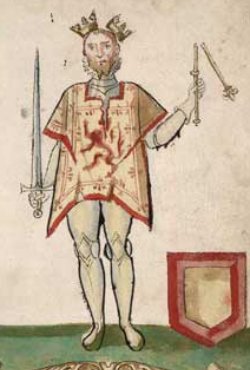
John Balliol, King of Scotland
Born: c. 1249
Died: November 25, 1314
Picardy, France (Age c. 65)
John Balliol in History
Being the fourth and youngest son of a minor Scottish lord, it was not expected that John Balliol would ever amount to anything significant, let alone become King of Scotland. But with the deaths of his father (1268) and his three elder brothers (by 1278), John was now in a position of power. He inherited his father's lands but still did not possess any kind of great wealth, as his mother kept her own inheritance and dowry. However, King Alexander III of Scotland had no male heirs, and the Balliols were one of the main contenders to the throne should the king die childless. Since John was now the head of the Balliol family, there was a good chance he would become King of Scotland. The claim came through John's mother, Devorguilla, a grandniece of the late King William I. Not a great deal is known of the early activities of John Balliol, but it appears that, before Alexander III's death in 1286, he played more of a role in northern English politics (the Balliols had extensive lands in the area) than in those of Scotland. Upon Alexander's death though, John became a major contender for the Scottish throne, along with a number of others, with the octogenarian Robert Bruce being his biggest competitor. 1290 would be a deciding year in John's life as his mother passed away, leaving him her vast territories and wealth within England and Scotland, and, also, Margaret, the young granddaughter of Alexander III that he had named as his official heir. John's new found wealth and the death of the "official" heir increased his chances to an even greater extent of succeeding to the throne.
For the next two years, the debate would rage on as to who would ascend the Scottish throne. The Scots were obliged to consult King Edward I of England, who was to act as a judge in the matter. Ultimately, it was decided that John was the rightful King of Scotland (based on primogeniture), and he was anointed in November 1292. John's accession, however, had repercussions, as Edward expected (as payment for his "services") to be officially acknowledged as overlord of Scotland. This meant that John would be obligated to obey the feudal laws in full, including providing the English king with soldiers should he go to war with France - a scenario that would, soon enough, arise.
Now that he was king, John filled a majority of the positions within the Scottish government with his vast number of friends and family members. John's short reign did see some important administrative advances, such as the strengthening of the relationship between king and parliament and of the king's grasp in the outlaw regions of the western highlands. However, relations between Scotland and England swiftly deteriorated. John was unhappy that he was forced to appeal to Edward I on a majority of cases within his own country. This, combined with an impending war between England and France, which John was summoned (in a demeaning fashion) to serve in, plunged John into rebellion. By 1296, a treaty (which has come to be known as the Auld Alliance) was signed between Scotland and France, greatly angering Edward I. The English king waged war against the Scots and quickly defeated them. John was captured, forced to confess to the rebellion and, finally, to abdicate the throne.
John remained an English prisoner until 1299, when it was agreed that he would be put in papal custody and was to live out the rest of his life in exile in France. Until 1303, there were rumors that, with the help of the French, John was set to return to Scotland's throne, but these never amounted to anything, and a final truce between England and France concluded that the former king would never again see his homeland. John died quietly in Picardy in 1314 as a man in his mid-sixties. The Scottish throne was ultimately obtained by Robert I, grandson to Robert Bruce, John's biggest competitor to the throne in the early 1290s.
John Balliol in Peele
Appears in: Edward I
John Balliol is anointed King of Scotland at the same time Edward I is anointed King of England within Edward I. Historically, this is extremely inaccurate considering Edward was anointed king in 1274 and John was not chosen to be king until 1292. Throughout the play, John's rebellion in Scotland is intertwined with Llywelyn and Dafydd's rebellion in Wales, despite the fact that John was not crowned until nine years after Dafydd's execution, which ends the play. The character of John Balliol and his actions represent one of the play's biggest historical inaccuracies in a highly episodic and historically inaccurate play. In the end, John is defeated and forced to abdicate his throne, though he is allowed to keep his life.
References
Stell, G. P.‘John [John de Balliol] (c.1248x50–1314)’, Oxford Dictionary of National Biography, Oxford University Press, Sept 2004; online edn, Oct 2005 [http://www.oxforddnb.com/view/article/1209, accessed 24 May 2010]